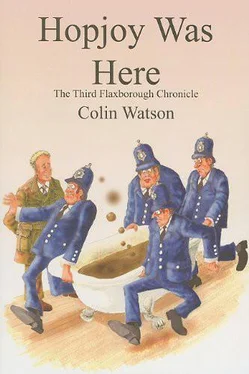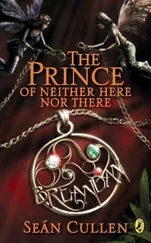“Could you make out who it was?”
She shook her head. “It was really just a dark shape moving about, a sort of shadow.”
“What happened after that?”
The woman looked thoughtfully into her teacup. “Nothing, really... Oh, except that a light did go on for a few seconds in Mrs Periam’s bedroom—what used to be her bedroom, I mean, though Gordon’s kept it exactly as it was, you know. Whoever went in must have pulled the curtains first; they were closed when the light was switched on.”
“You can’t think of anything else?”
“Not that night, no.”
“On another, then.”
She was silent for a moment. “I might have been imagining.”
“Never mind. Tell me about it.”
“Well, it was three or four nights later; I can’t remember exactly. I’d been downstairs for some Thermogene and was dozing off again when I heard water running. It made just the sort of gurgle that the Periams’ waste pipe always makes. But I’d seen no one about there for a few days, so I thought perhaps it came from one of the other houses. I didn’t think about it again until that day we saw some policemen messing about with the drains.”
Of course, Purbright told himself, the bath would have had to be emptied after the day or two needed to dissolve its occupant—or half occupant. He had not got round to giving the point much thought. Yet it would have been simple enough for Hopjoy either to have lain low in the house or to have made a quiet return visit at night for long enough to pull a plug. There was another matter he found much more puzzling.
“Tell me, Miss Cork,” he said slowly, “why these apparently insignificant things impressed you so deeply that you thought it your duty to send an anonymous letter.” He saw the look of surprise and alarm in the woman’s face and held up his hand. “No, don’t worry—there’s no question of your getting into any sort of trouble. As a matter of fact,” he added, “I haven’t even seen it.”
“But of course you haven’t seen it. It wasn’t sent to you. And anyway it had nothing to do with what I’ve been telling you. Had it, mother?” In her perplexity, Miriam made her first acknowledgment of the old woman’s silent presence.
Mrs Cork stared stonily at the inspector, then gave a stern little shake of her head.
Purbright frowned. “I don’t think I quite understand, Miss Cork. It was you who mentioned the letter in the first place to my sergeant. We assumed...”
“Oh, no. There’s been some mistake. I don’t think I want to talk about it. Not about that , I mean. I couldn’t.” Miss Cork’s sparsely fleshed features registered a mixture of righteousness and disgust.
“The letter was about something you saw?” Purbright gently persisted.
“Naturally.” Her lips closed again primly.
“At the house over the back?”
She nodded. Her expression guided Purbright’s next guess.
“There were...” he paused delicately, “...goings on?”
The woman turned and stared icily at the fire, as though willing it to go out.
Either Periam’s confession of disloyalty, reflected Purbright, had been a masterly understatement or else Miriam Cork possessed sensitivity remarkable even in a middle-aged spinster. He probed further.
“In a bedroom, I presume?”
Like the slow striking of a match came her reply. “On Mrs Periam’s bed.” There was a long pause. “Romping like dogs on a grave.” Another pause. “In the middle of the afternoon.”
“The girl...her name was Doreen: am I right?”
Miss Cork raised her eyes from the obstinately still burning fire and directed them at a big pair of binoculars that kept a Bible text propped against the wall above the mantelpiece. “Doreen Mackenzie,” she said, in a voice deliberately drained of tone.
“I see... Well, we needn’t dwell on that. Now this letter—I suppose you sent it to her fiancé?”
Again Miss Cork offered no immediate reply. Her hand crept once more to the centre of her ordeal by fig roll. “I’ve had this out in prayer,” she announced finally, “and I was told that I had taken the right road. The answer to your question is yes, if you feel it will do you any good. But I don’t want to talk about it any more.”
The inspector, taking her at her word, departed gracefully and not without satisfaction. Something which had puzzled him considerably was now clear.
The decision to encompass a man’s destruction by convincingly attributing a murder to him required very powerful provocation.
And the sort of revelations Miss Cork seemed capable of penning to a betrayed lover would provide, Purbright now felt sure, just that.
Chapter Sixteen
Charles Fawby, chief reporter of the Brockleston Shuttle and district correspondent for evening papers at Nottingham, Leicester and Lincoln and of all the national mornings as well, would have been the first to admit that his district was less productive of hard news than most. Its houses never burned down; no gunman had ever sought a share of the small turnover of Brockleston’s two branch banks; the hotel registers remained innocent of the aliases of adulterous celebrities; even the beach was lamentably safe.
And yet Brockleston-rooted stories flowered in the Press as persistently as daisies in a city lawn.
Like daisies, they were small. They appeared always at page bottoms. Fawby did not mind that. A guinea for a three-line drollery represented a much more satisfactory return for labour than ten pounds or so for a page lead that might take the best part of a day to work upon and half the evening to telephone to morose, sceptical and hostile copy-takers.
He knew exactly what would tickle a sub-editor’s fancy and help meet the insatiable demand for short ‘fills’. His remunerative gleanings ranged from scraps of unconscious humour in the officialese of the district council minutes to whimsical remarks by old gentlemen arraigned in the local magistrates’ courts for drunkenness. Quips, parochial paradoxes, providential puns on street names, ironic errors, quaint coincidences: all these fed Fawby’s paragraphs.
What even this perceptive and adroit young man could never have foreseen, though, was that one of his modest guinea-earners was destined to confound an inspector of police, snap a chain of singularly plausible but false evidence, and reveal a murderer.
The piece appeared at the foot of the fourth column on page one of the county evening having the largest sale in Flaxborough. It was headed SALT PORK, and ran, in Mr Fawby’s admirably pithy prose: ‘The season’s oddest catch was landed at Brockleston South jetty this morning by a Sheffield angler. It was half a pig, rather the worse for immersion. And the name of the fisherman? Mr Andrew Hogg.’
Purbright stared at the page as though he had spotted his own obituary. Then he rang for Sergeant Love. There was no reply from the C.I.D. room. Purbright remembered that Love was touting a cigarette lighter round the friends of the late Hopjoy.
The late... He realized with a start that the words had sprung quite spontaneously into his mind. Had he, despite the credit he had so readily accorded Hopjoy as an ingenious schemer, known all along that...
He read the paragraph again, and sighed. Coincidence in the matter of such relative rarities as wandering sides of pork was too much to hope for. And Brockleston, of all places...of course, the sea was precisely the sort of dumping ground that would have occurred to a man returning in a hurry to his seaside hotel and anxious to dispose of a murder prop that had served its turn. Even if the carcass were to wash up again, there was scarcely any possibility of its coming to the notice of a police force twelve miles away.
Читать дальше

![Fredrik Backman - Britt-Marie Was Here [Britt-Marie var här]](/books/61260/fredrik-backman-britt-marie-was-here-britt-thumb.webp)










